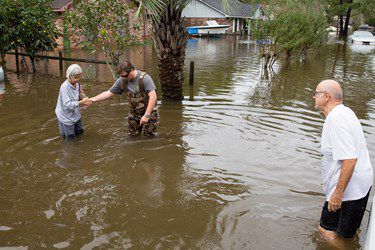Global Warming Means Stormwater Difficulties
Published on by Ashantha Goonetilleke, Professor, Water/Environmental Engineering at Queensland University of Technology in Academic
Climate change appears to present a direct challenge to stormwater management, according to the latest research.
“Two different studies published [in February] in the journal Proceedings of the National Academy of Sciences said that by 2100 the world’s oceans would rise between 28cm to 131cm, depending on how much heat-trapping gas Earth’s industries and vehicles expel,” The Guardian reported.
Tidal flooding, which is becoming increasingly routine, is making stormwater management difficult in places like Miami Beach, Charleston, SC, and Norfolk, VA, The New York Times reported, citing the same research.
“Between 2005 and 2014, a gauge at Kings Point in New York showed there were 157 days where the water reached above an established ‘nuisance’ level — double the total of the previous decade. A total of 96 of these flooding events are attributed to changes in the climate,” the report said. 
“In San Francisco, the number of human-caused flooding events is almost three times above the unaltered trend while Charleston in South Carolina endured 219 flooding days between 2005 and 2014, with the vast majority climate change-driven,” The Guardian reported.
Here’s the picture of what stormwater managers face as a result, per The New York Times :
Though these floods often produce only a foot or two of standing saltwater, they are straining life in many towns by killing lawns and trees, blocking neighborhood streets and clogging storm drains, polluting supplies of freshwater and sometimes stranding entire island communities for hours by overtopping the roads that tie them to the mainland.
The problem is only getting worse. A new analysis from Climate Central, a news organization, shows that the number of coastal flooding days has doubled since the ‘80s. The report blamed the warming of the atmosphere and the oceans.
“So far as I know, until now, no study has extended the links all the way from burning fossil fuels, to global warming, to sea level rise, to coastal floods that were caused unambiguously by us. But that is what collaborators and I have attempted to do in a new analysis,” co-author Benjamin Strauss wrote in a blog post.
Strauss directly linked global warming to today’s stormwater challenges.
“When a street floods with saltwater, and you can’t drive home, or you have to sandbag your store, human instinct looks for the nearby cause: it was a very high tide, or a strong wind blew from the wrong direction. But what if the tide or the wind were not enough to tip the balance? What if the waters would not have crossed the last lip, the critical threshold, without a few inches of boost? Now we have looked into the pool of water gathered on the asphalt and found an uncomfortable answer reflecting back: the flood is us,” he wrote.
Attached link
http://www.wateronline.com/doc/global-warming-means-stormwater-difficulties-0001Taxonomy
- Stormwater